Odd Names
The Hobo Jungle Murder
You might or might not be surprised at the number of hits one gets when searching for "hobo murder." I guess that milieu was a really violent one. In any case, I highlight this instance for the great hobo names. I assume "Knubbs" meant "nubs," referring to the dead man's lack of hands.What would your own hobo name be, by the way?


Posted By: Paul - Tue Sep 26, 2023 -
Comments (0)
Category: Bums, Hobos, Tramps, Beggars, Panhandlers and Other Streetpeople, Death, Odd Names, Police and Other Law Enforcement, 1940s
Hitler Species
There are two species of insects named after Hitler. The mystery, however, might be why more creatures weren't named after Hitler by German scientists during the 1930s, as a way to curry favor with him. The answer, surprisingly, seems to be that requests were made, but Hitler would always ask for his name not to be used. (The insect researchers never asked for his permission). Text from The Art of Naming by Michael Ohl (2018 translation):To date, Anophthalmus hitleri has been found in but a handful of caves in Slovenia. Particularly after the media discovered and circulated the Hitler beetle story in 2000, interest in this species has been rekindled. A well-preserved specimen of Anophthalmus hitleri can fetch upward of 2,000 euros on the collectors' market; among the bidders, certainly some wish to add the Hitler beetle to their collection of Nazi memorabilia. . .
At least one other species has been named after Adolf Hitler: the fossil Roechlingia hitleri, which belongs to the Palaeodictyoptera, a group of primitive fossil insects. Roechlingia hitleri was described in 1934 by German geologist and paleontologist Paul Guthörl. . .
Extensive research has failed to turn up any other species named in honor of Hitler. This seems surprising, as this form of salute could have proven quite expedient to aspiring German scientists from about 1933 until 1945, at the latest...
The likeliest explanation is that when Hitler patronyms were planned, approval was sought in advance from the Führer (by way of the Reich Chancellery), whether out of respect or perhaps fear of potential consequences. In 1933, for instance, a rose breeder submitted a written request to the Reich Chancellery for permission to introduce to the international market one of his best rose varieties, bearing Hitler's name. Similarly, a nursery owner from Schleswig-Holstein hoped to name a "prized strawberry variety" the "Hitler strawberry," in honor of the Reich Chancellor. They already had a "Hindenburg" strawberry variety in their catalog, he added. In reply to both cases, Hans Heinrich Lammers, Chief of the Reich Chancellery, sent almost identical letters, in which the inquiring parties were informed that, "upon careful consideration, [the reich Chancellor] requests that a name in his honor most kindly not be used." . . .
Perhaps this fundamental rejection of honorary names is the reason that so few hitleris exist.
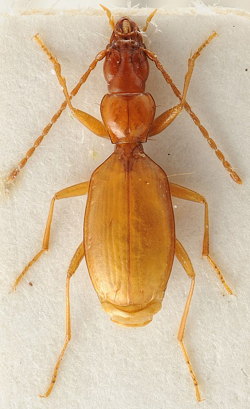
Anophthalmus hitleri
source: Wikipedia
Posted By: Alex - Fri Sep 01, 2023 -
Comments (1)
Category: Dictators, Tyrants and Other Harsh Rulers, Insects and Spiders, Odd Names, Science
Ugley Women’s Institute
The Women's Institute, according to Wikipedia, is a "community-based organisation for women in the United Kingdom, Canada, South Africa and New Zealand." The first Women's Institute branch in the UK was established in 1915. And by the 1920s the village of Ugley in Essex had its own branch, making it the Ugley Women's Institute.The jokes began soon after. An Apr 13, 1945 column in the Saffron Walden Weekley News notes:
By the 1950s the members of the Ugley Women's Institute had apparently grown tired of the jokes. Newspapers reported a name change:
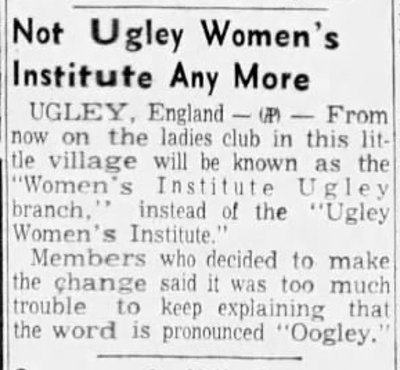
Evansville Press - Mar 24, 1956
However, I find that the same story then kept popping up throughout the late 1950s and 1960s, always reported as if it was breaking news, which makes me wonder if it was true in the first place. In the UK Register of Charities the organization is still listed as the Ugley Women's Institute.
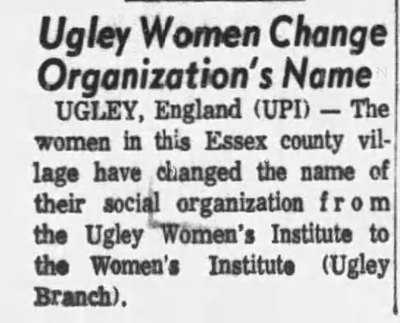
Wisconsin State Journal - Sep 9, 1962
Incidentally, the village of Ugley also has an Ugley Farmers Market. And the town of Loose, in Kent, boasts the Loose Women's Institute.
Posted By: Alex - Wed Jun 21, 2023 -
Comments (2)
Category: Clubs, Fraternities and Other Self-selecting Organizations, Odd Names, Women
Linoleumville
The Wikipedia page gives the history of the name:In 1873, the American Linoleum Company acquired 300 acres in the area to build the nation's first linoleum factory. The inventor of Linoleum, Frederick Walton, spent two years in Travis setting up the factory.[3] Many skilled English immigrants arrived to work in the factory in its early days, and the area being was named Linoleumville. By the early 20th century, 700 workers were employed, comprising half the local population. Many of these were Polish immigrants, and Linoleumville had become a Polish enclave.[4][5] The plant closed in 1931 and residents overwhelmingly chose to rename the community Travis.[1]
The name change vote prompted journalistic joshing at the time. But the second piece--by the later-famous historian Bruce Catton--stuck up for the name.
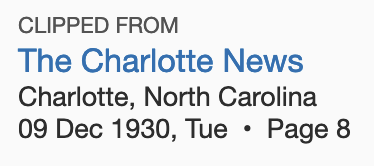

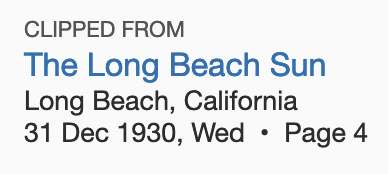

Posted By: Paul - Wed May 17, 2023 -
Comments (2)
Category: Odd Names, Regionalism, 1930s
RIP Yon Zircle Bowlin
Yon Zircle Bowlin died last week at the age of 94. His weird claim to fame was that he was the final-born member of the Bowlin "alphabet family."His parents, Allen and Sarah Bowlin, named all their kids in alphabetical order (first and middle names). They ended up having 13 kids, completing the alphabet.
The 13 kids: Audie Bryant, Curtis Drue, Era Faye, Grady Hampton, Ida Jeanette, Knola Leantha, Millard Nathan, Olivia Penelopi, Quincy Ruth, Sarah Thelma, Ulysses Vinson, Wilson Xava, and Yon Zircle.
Yon Zircle's obituary: Brown Funeral Home
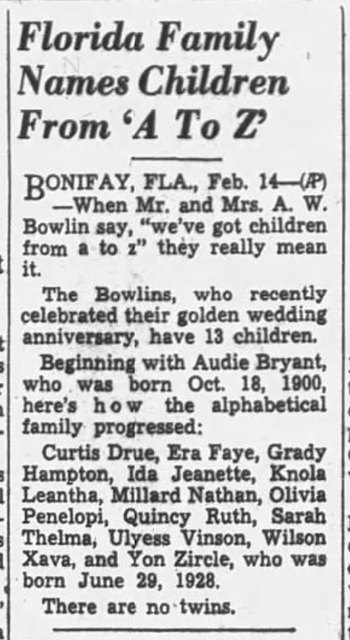
Montgomery Advertiser - Feb 15, 1950
Posted By: Alex - Thu Apr 27, 2023 -
Comments (2)
Category: Death, Odd Names
Ubiquitous Perpetuity God
1985: Enrique Silberg had previously tried to change his name to God, but was denied on the grounds that it would be confusing and that he also needed a first name. Finally he convinced a judge to let him change his name to Ubiquitous Perpetuity God.1996: Ubiquitous Perpetuity God was sentenced to nine months in Marin County Jail for indecent exposure, a crime that he had 17 prior convictions for. He said that he exposed himself to women so that they "could have some type of awareness of God".
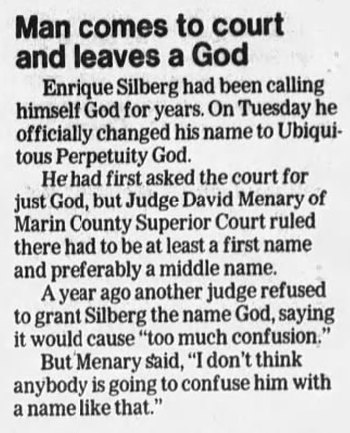
San Francisco Examiner - Apr 18, 1985
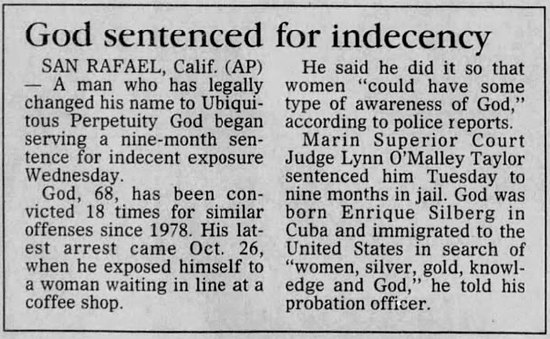
Memphis Commercial Appeal - Feb 15, 1996
Posted By: Alex - Thu Mar 16, 2023 -
Comments (1)
Category: Crime, Odd Names, Religion
Stange Seasoning
The name isn't as bad as Hurff Canned Goods, but even so, Stange Seasoning doesn't sound very appetizing.Stange was acquired by McCormick and Co. in 1980.
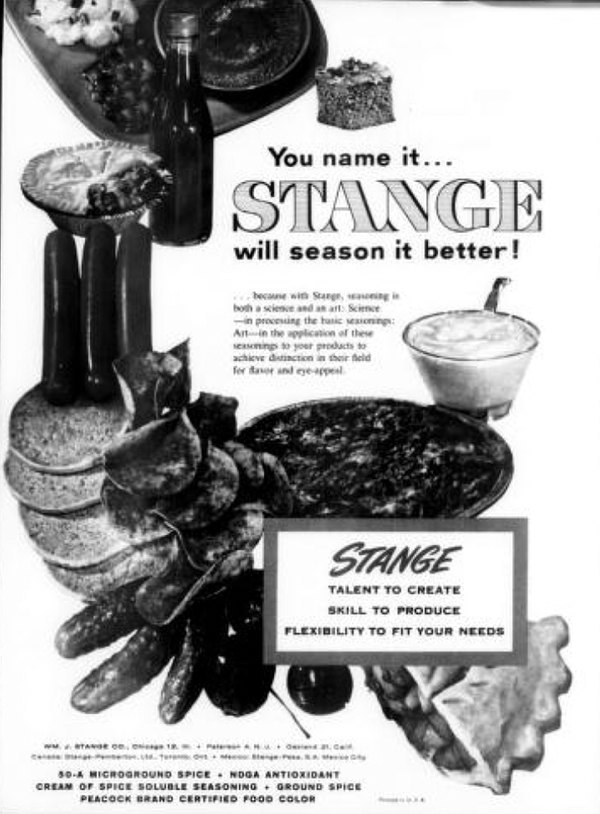
Food Technology - Sep 1958
Posted By: Alex - Sun Jan 15, 2023 -
Comments (0)
Category: Food, Odd Names
Skina Babe
Skina Babe, produced by Mochida Pharmaceutical Co., has been a popular brand of baby bath oil in Japan for decades. Mochida trademarked the name in the U.S. However, I don't believe it ever tried to introduce the product in an English-language market, which seems just as well.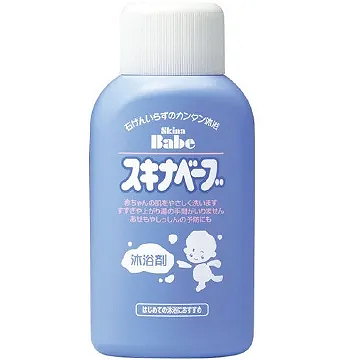
Incidentally, Mochida also sells "Skina Fukifuki," which is a skin cleanser for senior citizens.
More info: mochida.co.jp
Posted By: Alex - Thu Dec 08, 2022 -
Comments (0)
Category: Babies, Odd Names, Asia
SHT and SCAT
In his 1983 book Big Business Blunders: Mistakes in Multinational Marketing, David Ricks tells the following story:I've been able to find ads for SHT, such as the one below, but none exactly like the one that Ricks describes. Which doesn't mean the ad doesn't exist. Just that it isn't in any journals archived online.
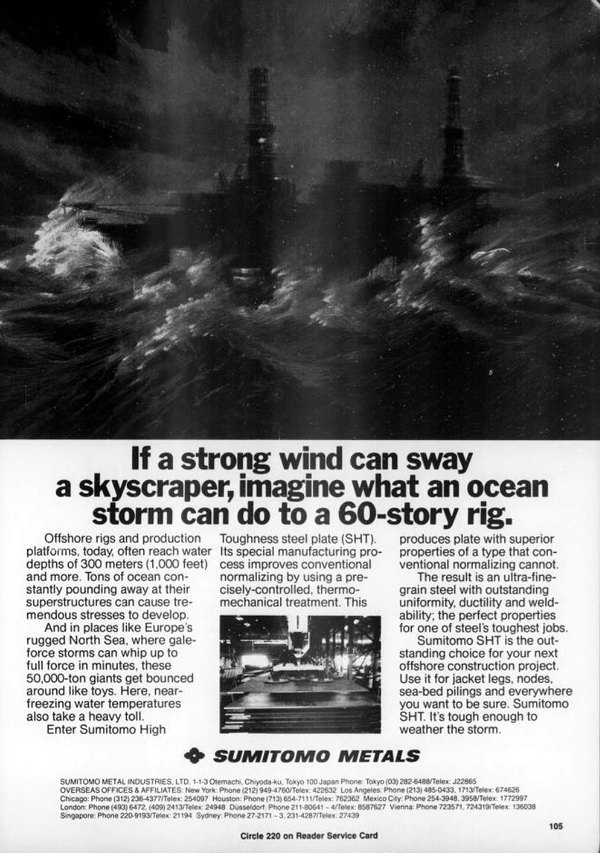
However, among the ads for SHT that I was able to find, I found one that actually improves (and possibly complicates) Ricks's story. Because it turns out that Sumitomo had another product, Sumitomo Calcium Treatment, that it abbreviated as SCAT.
Once I could accept as an honest mistake, but coming up with scatalogical abbreviations twice seems intentional. I'm guessing either someone at Sumitomo thought it was funny, or someone at the Japanese agency was having a joke at their expense.
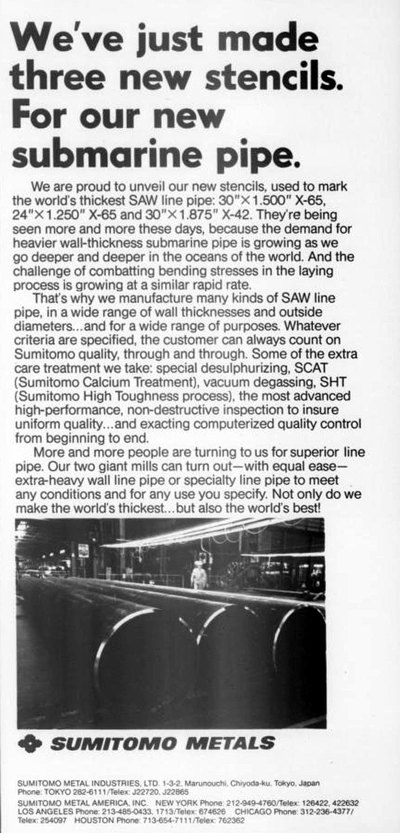
Posted By: Alex - Sun Nov 27, 2022 -
Comments (1)
Category: Business, Products, Odd Names, Excrement, 1980s
The new Perth Museum
In order to find a name for the new museum opening in Perth City Hall, city officials surveyed the public and considered over 450 ideas before deciding to call it "Perth Museum." bbc.com
This recalls the time, in 1973, when the Army Materiel Command (AMC) held a contest to name its new headquarters and, after considering 524 different proposals, awarded the prize to the guy who suggested calling it the AMC Building.
Posted By: Alex - Fri Nov 11, 2022 -
Comments (0)
Category: Museums, Odd Names

| Who We Are |
|---|
| Alex Boese Alex is the creator and curator of the Museum of Hoaxes. He's also the author of various weird, non-fiction, science-themed books such as Elephants on Acid and Psychedelic Apes. Paul Di Filippo Paul has been paid to put weird ideas into fictional form for over thirty years, in his career as a noted science fiction writer. He has recently begun blogging on many curious topics with three fellow writers at The Inferior 4+1. Contact Us |




